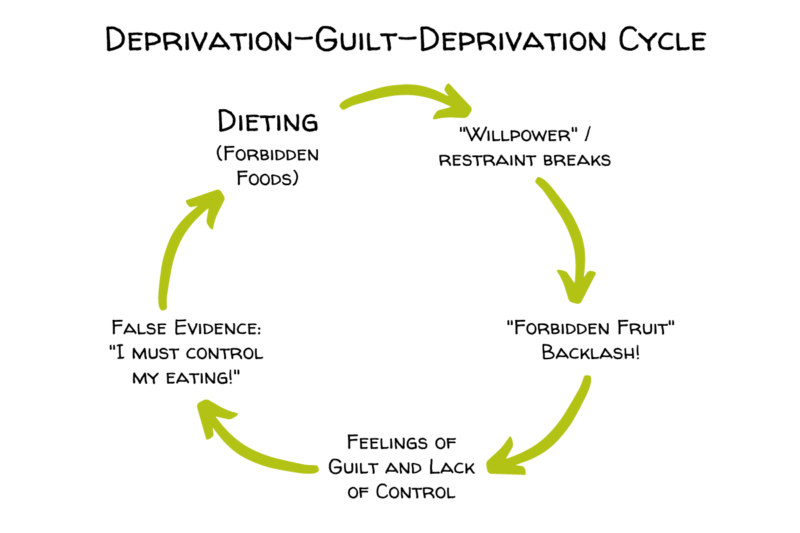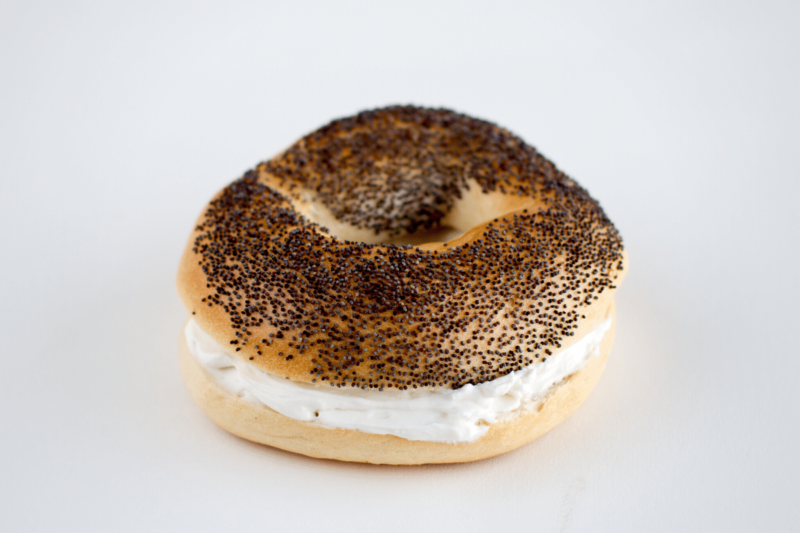
One of the so-called “holy grails” of practicing intuitive eating is the day when cupcakes having no more of a hold on you than, say, broccoli. The day when you can have freshly baked chocolate chip cookies in the kitchen, enjoy some, then go about the rest of your day or evening without them calling to you from the kitchen, the way the sirens called to Ulysses. The day when you have become habituated to formerly forbidden foods.
Habituation is what happens when you’re exposed to the same stimulus repeatedly, whether it be food, a relationship or a car, and the novelty starts to wear off. Think about when you buy a new piece of art for your living room wall. You love it, you hang it up, and you look at it all the time…at first. Eventually, you come to barely notice it. When you do happen to look at it intentionally, you may still enjoy it and find it pleasing, but you’re not as excited as the day you bought it and put it on display.
Similarly, if you make something really yummy for dinner and eat leftovers for lunch the rest of the week, after the first few days you probably find that you’re not too excited to eat lunch, even if it’s just as yummy, technically, as it was on the first day.
This habituation response is a key part of making peace with food, one of the principles of Intuitive Eating. You still find joy in food, you still look forward to having favorite foods, but you no longer feel like it’s an all-or-nothing situation. In other words, you don’t have to try to have none of a food to avoid wanting to have all of the food.

Food rules are the enemy of food habituation
One big problem with food restriction imposed by dieting is that forbidden-food rules prevent the food habituation response. Forbidden foods remain novel and exciting, and this sets up the deprivation-guilt-deprivation cycle, pictured above. These foods may be forbidden in action (you try to keep them out of your house, for example) or in mindset (you eat them but feel like you shouldn’t be).
The first part of the solution is to strip food of its emotional baggage by moving towards food neutrality. This includes mentally stepping back from the idea that certain foods are “good” and other foods are “bad.”
For example, while strawberries and strawberry-flavored gummy bears are both red and both involve the word “strawberry,” they’re clearly not nutritionally equal. However, they are morally equal. In other words, you’re not “good” when you eat fresh strawberries and bad when you eat strawberry gummy bears.
The second part of making peace with — and habituating to — formerly forbidden foods (and to foods that you allow yourself but feel out of control with) can feel harder. This part relies on allowing yourself to eat the food you truly want, then enjoying that food without placing conditions on your enjoyment.

The perils of pseudo-permission
I’ve worked with many clients who are on their intuitive eating path, and they tell me they are giving themselves unconditional permission to eat what sounds good to them, but still struggling with feeling out of control or guilty. We end up uncovering that they have actually been giving themselves false permission, or pseudo-permission. They were putting conditions on their permission, and their enjoyment, without realizing it.
Alas, it’s a common trap for anyone who is in the process of breaking free from diet or wellness culture. A few examples of false, pseudo or “conditional” permission to eat are thoughts like:
- “I’ll allow myself to eat it, but I’ll feel guilty about it.”
- “I’ll allow myself to eat it, but I’ll eat extra ‘healthy’ the rest of the day.”
- “I’ll allow myself to eat it, but I’ll do extra exercise tomorrow.”
For an excellent discussion of what habituation to a forbidden food might look like, I recommend listening to Evelyn Tribole’s interview on the “Ten Percent Happier” podcast. Starting at the 43:20 mark, Evelyn (the co-creator/co-author of “Intuitive Eating”) helps host Dan Harris with his tendency to engage in out-of-control eating with Oreos by working towards habituation.

A story about bagels (but not really)
One of my former clients was trying really hard to be a “healthy” eater, but she felt that if she didn’t eat perfectly, she was a failure. This would sometimes lead to some serious binges when life or work felt really stressful, because on top of that and she wasn’t eating enough food, generally, and enough food she enjoyed, specifically, due to the pressure she put on herself to be a healthy eater.
We were working on the idea of nourishing herself regularly throughout the day with foods that would satisfy her. I nearly cried when she told me this story:
She’d eaten breakfast early (she’s an early riser), so by the time she got to work, about four hours had elapsed and she was hungry again. She really wanted a bagel with cream cheese and a coffee with cream. She gave herself permission to get them, and she said they tasted amazing.
While honoring her hunger and allowing herself to choose foods that brought her joy and satisfaction were big wins in and of themselves, there was an even bigger unforeseen benefit.
An unexpected appointment prevented her from eating lunch until 2 p.m., but the bagel and coffee fueled her enough so that she was manageably hungry when she had a chance to eat the nutritious lunch she had brought from home. She felt happy and energized when she left work, and looked forward to cooking dinner when she got home.

But wait, there’s more!
She told me that she could see clearly what would have happened if she still been restricting and trying to eat “perfectly” like she had been before we started working together:
- She would have ignored her late-morning hunger, and certainly wouldn’t have allowed herself a bagel, because, hello, carbs.
- She would have been PRIMALLY hungry at 2 p.m., found zero appeal in the smoothie that was her “acceptable” lunch at the time, headed to a nearby restaurant, ordered a ton of food, eaten it all, and returned to work feeling guilty and physically uncomfortable. Those feelings would have followed her home, where she would have binged again, then felt horrible the entire next day.
Incidentally, one reason she had been avoiding bagels was because she told herself that bagels would make her bloated. Well, she discovered that’s not true!
She continued to allow herself to have a bagel when she wanted one, fully enjoying it each time. Then, a few weeks later, she told me that she had been at the grocery store one and was about to head to the bakery section to get more bagels — then realized that she was a little tired of bagels for now, and was actually craving salads. This so-called “bad” food was now just one of many foods she enjoyed, and she could take it or leave it. Bagels were no longer a “forbidden” fruit that had a hold on her.
So, the key element in this story is a humble bagel, which seems like a small thing, but turned out to be a very big thing. Of course, it’s not JUST about the bagel…it’s about the mindset shift that allowed the bagel to happen. But this shift had a lasting positive effect.
Stay tuned
Next week, I’ll talk about some common obstacles to developing habituation, as well as some tips for starting to habituate yourself to a food that you don’t really trust yourself with.
This post contains Amazon Affiliate links. As an Amazon Associate I earn from qualifying purchases.
Disclaimer: All information provided here is of a general nature and is furnished only for educational purposes. This information is not to be taken as medical or other health advice pertaining to an individual’s specific health or medical condition. You agree that the use of this information is at your own risk.
Hi, I’m Carrie Dennett, MPH, RDN, a weight-inclusive registered dietitian, nutrition therapist and body image counselor. I offer compassionate, individualized care for adults of all ages, shapes, sizes and genders who want to break free from eating disorders, disordered eating or chronic dieting. If you need to learn how to manage IBS symptoms with food, or improve your nutrition and lifestyle habits to help manage a current health concern or simply support your overall health and well-being, I help people with that, too.
Need 1-on-1 help for your nutrition, eating, or body image concerns? Schedule a free 20-minute Discovery Call to talk about how I can help you and explore if we’re a good fit! I’m in-network with Regence BCBS, FirstChoice Health and Providence Health Plan, and can bill Blue Cross and/or Blue Shield insurances in many states. If I don’t take your insurance, I can help you seek reimbursement on your own. To learn more, explore my insurance and services areas page.
 Print This Post
Print This Post






